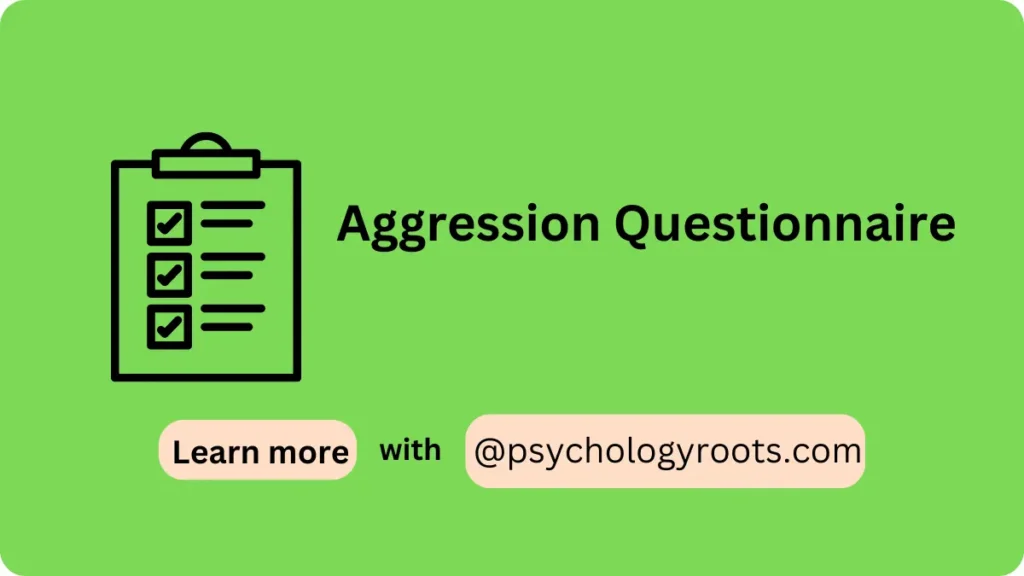Table of Contents
Aggression Questionnaire
Here in this post, we are sharing the “Aggression Questionnaire”. You can read psychometric and Author information. We have thousands of Scales and questionnaires in our collection (See Scales and Questionnaires). You can demand us any scale and questionnaires related to psychology through our community, and we will provide you with a short time. Keep visiting Psychology Roots.
About Aggression Questionnaire
Scale Name
Aggression Questionnaire
Author Details
Western Psychological Services
Translation Availability
Not Sure

Background/Description
Aggression is a complex behavior that can be influenced by a variety of factors including genetics, environment, and individual experiences. It can manifest in different ways such as physical violence, verbal outbursts, or passive-aggressive behavior. Understanding and managing aggression is important for maintaining healthy relationships and promoting personal well-being.
Types of Aggression:
- Physical Aggression: This involves physical harm or violence towards others.
- Verbal Aggression: This includes yelling, shouting, or using harsh words to hurt or intimidate others.
- Passive-Aggressive Behavior: This involves expressing aggression indirectly through sarcasm, silent treatment, or withholding information.
- Instrumental Aggression: This is goal-oriented aggression aimed at achieving a specific outcome.
Causes of Aggression:
- Biological Factors: Genetics, brain chemistry, and hormonal imbalances can contribute to aggressive behavior.
- Environmental Factors: Stressful situations, exposure to violence, and upbringing can also play a role.
- Psychological Factors: Low self-esteem, anger issues, and personality disorders can contribute to aggression.
Managing Aggression
- Self-awareness: Recognize your triggers and early warning signs of aggression. Practice mindfulness and self-reflection to understand the underlying causes of your aggression.
- Communication: Learn effective communication skills to express your feelings and needs without resorting to aggression. Use “I” statements to express yourself without blaming or attacking others.
- Stress Management: Identify and manage sources of stress in your life. Practice relaxation techniques such as deep breathing, meditation, or yoga to reduce stress and promote calmness.
- Anger Management Techniques: Count to 10 before responding to a provoking situation. Take a time-out to cool down and collect your thoughts. Use physical activity as an outlet for pent-up aggression, such as going for a walk or engaging in sports.
- Seek Professional Help: Consider therapy or counseling to address underlying issues contributing to your aggression. Consult a healthcare provider for medical evaluation and treatment if aggression is related to a physical or mental health condition.
- Conflict Resolution: Learn conflict resolution skills to resolve disagreements peacefully and constructively. Practice empathy and try to understand the other person’s perspective.
- Avoid Alcohol and Drugs: Substance abuse can exacerbate aggressive tendencies, so it’s important to limit or avoid alcohol and drugs.
Administration, Scoring and Interpretation
- Preparation: Ensure a quiet and private environment for administration to minimize distractions. Provide clear instructions to the participant about the purpose and confidentiality of the assessment.
- Administration: Administer the aggression scale according to the standardized procedures specified in the manual. Ensure that participants understand each item and have the opportunity to ask questions if needed. Encourage honest and accurate responses to obtain reliable data.
- Scoring: Score the aggression scale based on the guidelines provided in the manual. Calculate total scores for each subscale (e.g., physical aggression, verbal aggression) and overall aggression score.
Reliability and Validity
N/A
Available Versions
28-Items
Reference
N/A
Important Link
Scale File:
Disclaimer
Please note that Psychology Roots does not have the right to grant permission for the use of any psychological scales or assessments listed on its website. To use any scale or assessment, you must obtain permission directly from the author or translator of the tool. Psychology Roots provides information about various tools and their administration procedures, but it is your responsibility to obtain proper permissions before using any scale or assessment. If you need further information about an author’s contact details, please submit a query to the Psychology Roots team.
Help Us Improve This Article
Have you discovered an inaccuracy? We put out great effort to give accurate and scientifically trustworthy information to our readers. Please notify us if you discover any typographical or grammatical errors.
Make a comment. We acknowledge and appreciate your efforts.
If you have any scale or any material related to psychology kindly share it with us at psychologyroots@gmail.com. We help others on behalf of you.